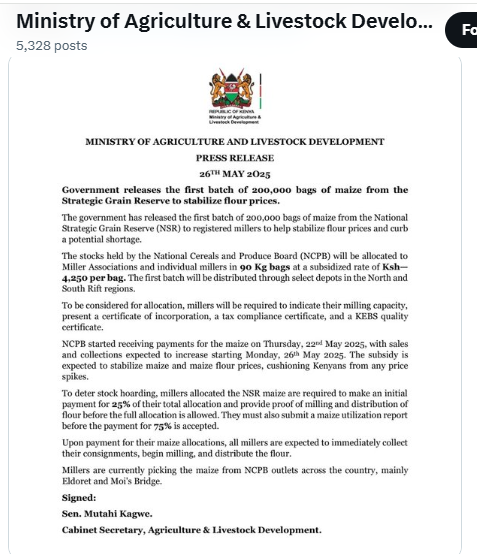Relief for Kenyans as state releases maize from strategic reserves amid soaring prices

In a decisive move to address the growing concern over rising flour prices and a looming maize shortage, the government has released the first batch of 200,000 bags of maize from the National Grain Reserve (NSR).
The announcement was made by Agriculture Cabinet Secretary Mutahi Kagwe on Monday, May 26, 2025, confirming that the subsidised maize will be allocated to registered millers across the country.
According to Kagwe, the maize will be distributed through selected National Cereals and Produce Board (NCPB) depots in the North and South Rift regions. The regions are key agricultural hubs and home to a significant number of milling companies.
“This release aims to cushion consumers from the sharp increase in flour prices and ensure a stable supply across the country,” Kagwe said in a statement seen by People Daily Digital.
“The allocation process has been designed to ensure transparency and accountability in the distribution of the maize.”
The maize, held in the government’s strategic reserves, will be sold at a subsidised rate of Ksh4,250 per 90-kilogram bag. This price is considerably lower than current market rates and is expected to lead to a reduction in flour prices on supermarket shelves in the coming weeks.

To be eligible for allocation, Kagwe said millers must meet a strict set of criteria.
“To be considered, millers will be required to indicate their milling capacity, and present a certificate of incorporation, a tax compliance certificate, and a KEBS quality certificate,” the statement outlined.
The government began receiving payments for the maize on Thursday, May 22, 2025. Sales and physical collection are expected to ramp up starting Monday, May 26.
However, access to the full allocation will be conditional on compliance with government guidelines aimed at deterring hoarding and ensuring equitable distribution.
Millers will be required to make an initial payment of 25 per cent of their total allocation upfront. Additionally, they must provide proof of milling and evidence that flour has been distributed to the market. Only after submitting this documentation will they be allowed to access the remaining 75 per cent of their allocation.
“Millers must also submit a maize utilisation report before the payment for the remaining 75 per cent is approved,” Kagwe’s statement emphasised.
The decision comes amid mounting public concern over food security, as poor rainfall and rising input costs have affected maize production. Consumers have already begun feeling the impact, with flour prices increasing steadily in recent months.
Agriculture stakeholders have welcomed the move but called for additional long-term strategies to address the cyclical nature of maize shortages in the country
“This intervention is necessary, but sustainable solutions lie in supporting farmers to increase productivity and reduce post-harvest losses,” said a representative from the Cereal Millers Association.















